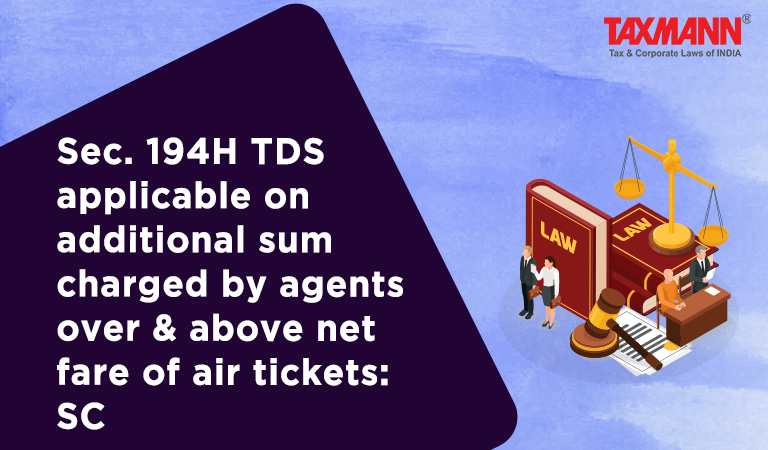Sec. 194H TDS applicable on additional sum charged by agents over & above net fare of air tickets: SC
- Blog|News|Income Tax|
- 2 Min Read
- By Taxmann
- |
- Last Updated on 17 November, 2022

Case Details: Singapore Airlines Ltd. v. CIT - [2022] 144 taxmann.com 221 (SC)
Judiciary and Counsel Details
-
- Surya Kant & M. M. Sundresh, JJ.
Facts of the Case
Assessee-company engaged in the business of air transport services. The business mechanism of the assessee involves booking tickets through travel agents. The base fare for air tickets was set by International Air Transport Association (IATA). However, the airlines may sell their tickets for a net fare lower than the Base Fare, but not higher.
Travel agents act on behalf of airlines to market and sell tickets and they are entitled to a commission on the basic fare of the ticket fixed by the IATA.
Further, airlines have no control over the actual fare at which the agents sell tickets. The agents are at liberty to set a price lower than the Base Fare fixed by IATA but still higher than the Net Fare demanded by the airline itself.
The additional amount charged by travel agents over and above the Net Fare quoted by airlines was retained by the agents as their own income.
The issue before the Supreme Court was:
“Whether the amount retained by the agents, over and above the Net Fare of air tickets were to be treated as commission for deduction of tax at source under section 194H?”
Supreme Court Held
The Supreme Court of India held that there is a distinction between a contract of agency and a contract of sale. A contract of sale is executed where the title of the goods is transferred by the seller to the buyer.
As per the agreement between the airline and the agent, the agent would sell the ticket as per the directions of the airline and in case of any loss incurred by the agent, he would be indemnified by the airline.
There was no contract of sale between the assessee and the travel agent. The airline retains title over the travel tickets and is responsible for the actual services provided to the final consumer.
Further, as per the agreement, “all monies” collected by the agents on the sale of air tickets will be held by them in a fiduciary capacity. Accordingly, there was a contract of agency and not a contract of sale.
Further, the arrangement between the purchaser of the ticket and the agent is merely a part of the agency agreement and not a separate agreement. The extra benefit gained by the agent on the sale of tickets is due to the agency agreement entered with the airline.
Thus, these amounts were incidental to the transaction by which the air tickets were sold on behalf of airlines and was for the benefit of agents. Such incidental benefit must come under the ambit of the principal-agent relationship.
The commission under section 194H includes any payment received directly or indirectly by the agent on the behalf of the principal. It does not distinguish the payment based on the source of such receipt.
Therefore, the amount retained by the agents on sale of air tickets was a supplementary commission, liable for deduction of tax at source, under section 194H.
Disclaimer: The content/information published on the website is only for general information of the user and shall not be construed as legal advice. While the Taxmann has exercised reasonable efforts to ensure the veracity of information/content published, Taxmann shall be under no liability in any manner whatsoever for incorrect information, if any.

Taxmann Publications has a dedicated in-house Research & Editorial Team. This team consists of a team of Chartered Accountants, Company Secretaries, and Lawyers. This team works under the guidance and supervision of editor-in-chief Mr Rakesh Bhargava.
The Research and Editorial Team is responsible for developing reliable and accurate content for the readers. The team follows the six-sigma approach to achieve the benchmark of zero error in its publications and research platforms. The team ensures that the following publication guidelines are thoroughly followed while developing the content:
- The statutory material is obtained only from the authorized and reliable sources
- All the latest developments in the judicial and legislative fields are covered
- Prepare the analytical write-ups on current, controversial, and important issues to help the readers to understand the concept and its implications
- Every content published by Taxmann is complete, accurate and lucid
- All evidence-based statements are supported with proper reference to Section, Circular No., Notification No. or citations
- The golden rules of grammar, style and consistency are thoroughly followed
- Font and size that’s easy to read and remain consistent across all imprint and digital publications are applied



 CA | CS | CMA
CA | CS | CMA
